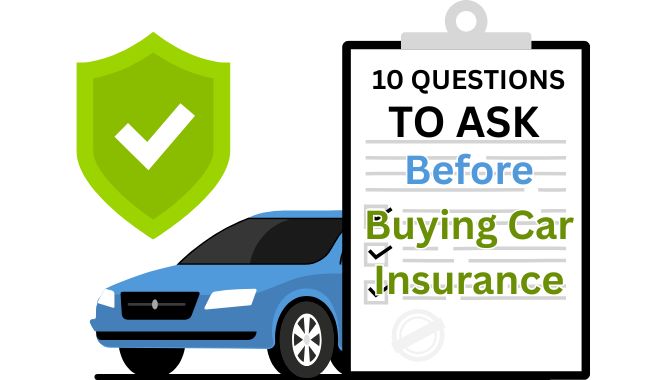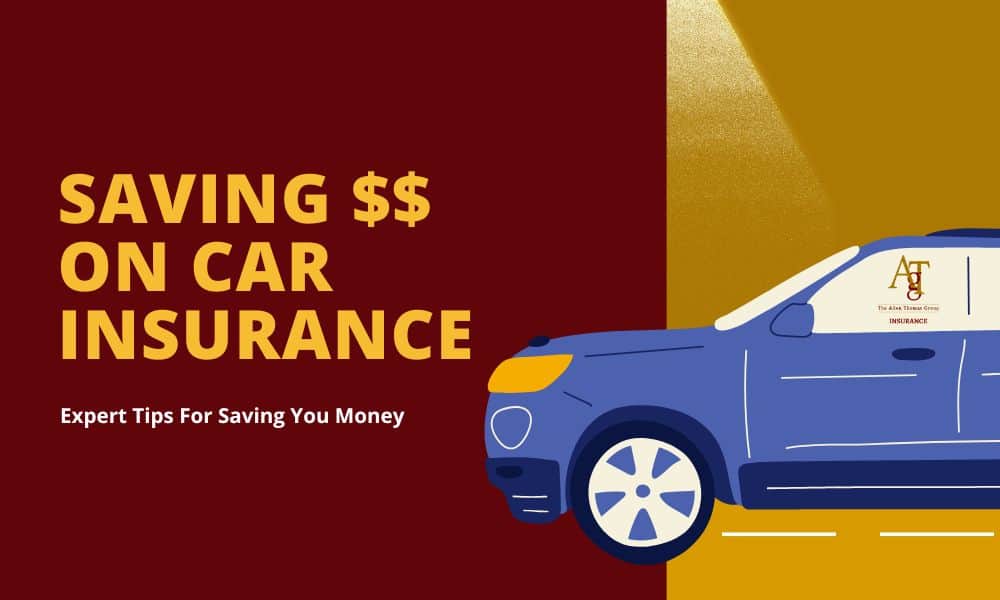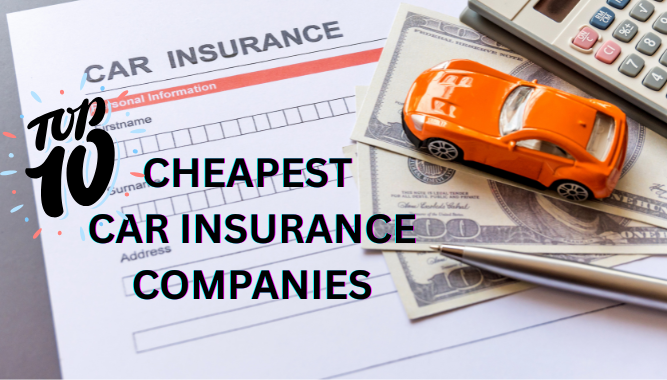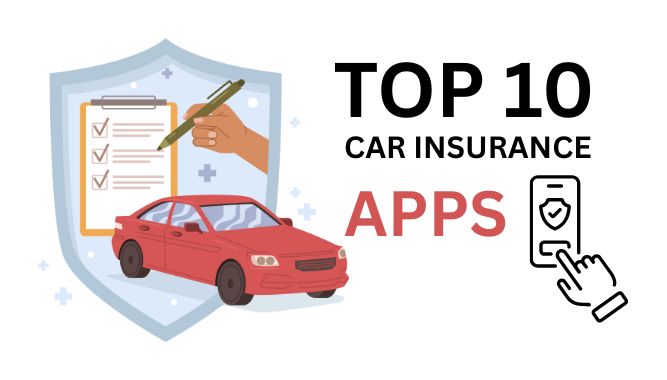Make smarter choices, avoid hidden fees, and save more with the right policy!
Buying car insurance can be confusing. There are dozens of providers, tons of policy types, and lots of fine print. Whether you’re a first-time buyer or switching companies, asking the right questions can save you hundreds—if not thousands—of dollars each year.
With rising inflation and living costs, car insurance savings are more important than ever. This guide walks you through the 10 most essential questions that will protect your wallet and help you avoid common traps.
Let’s break down the 10 most important questions you should ask before signing the dotted line.
🚗 1. What Types of Coverage Do I Really Need?
Not everyone needs full coverage. Understanding what each type of coverage offers helps you avoid overpaying for protection you might not even need.
🔍 Key Coverage Types:
-
Liability: Covers damage or injury you cause to others. Required by law in most states.
-
Collision: Pays for damage to your own car from an accident, regardless of fault.
-
Comprehensive: Covers non-collision incidents like theft, fire, falling objects, or animal strikes.
-
Uninsured/Underinsured Motorist: Protects you if someone hits you and doesn’t have enough (or any) coverage.
💡 Real-Life Example:
If you’re driving a 2010 Toyota Corolla worth $3,000, paying $600/year for comprehensive coverage might not be worth it. If your car gets totaled, your payout may not exceed the premiums you’ve already paid over time.
🎯 Pro Tip: Use your car’s actual cash value (ACV) to guide what coverage is worth keeping. Websites like Kelley Blue Book can help estimate this.
💰 2. What’s the Total Cost of the Policy—Not Just the Monthly Premium?
Many people get attracted by low monthly payments like “Only $39/month!”—but that often hides the true cost of the policy.
Ask for:
-
Annual premium amount
-
Hidden fees
-
Payment processing charges
-
Down payment or upfront cost
✔️ Tip: Always calculate the annual cost, not just monthly. That $39/month policy could easily turn into $600–$800 a year once fees and taxes are added in.
💡 Real-Life Mistake:
A user signed a policy advertised at $49/month, but with fees and add-ons, ended up paying $980/year—double what she expected.
🧾 3. What’s My Deductible and How Does It Affect My Premium?
Your deductible is the amount you must pay out of pocket before the insurance covers the rest. Choosing the right deductible is a balancing act.
💡 Example Comparison:
| Deductible | Monthly Premium |
|---|---|
| $500 | $120 |
| $1,000 | $95 |
Choosing a higher deductible usually lowers your premium, but make sure you can actually afford to pay it if you get into an accident.
📍 Scenario:
If you only have $600 in savings, choosing a $1,000 deductible might backfire when you need repairs after a collision.
🏆 4. Are There Any Discounts I’m Eligible For?
Most people qualify for multiple discounts, but insurers won’t always mention them unless you ask. Don’t leave money on the table.
Common Discounts Include:
-
Safe driver (no accidents/tickets for 3–5 years)
-
Low mileage (e.g., under 7,500 miles/year)
-
Multi-car or multi-policy bundles
-
Good student
-
Anti-theft devices
-
Military, veteran, or senior
🛠 Real Example:
One user in Texas saved 20% by bundling their renters and auto policy through the same provider. That translated to over $250 in annual savings.
🎯 Ask your insurer:
“What discounts do I qualify for based on my driving, car features, and lifestyle?”
🏷 5. What’s Not Covered in This Policy?
Many buyers only find out what’s not covered after they file a claim—and it’s denied. That’s a terrible time to learn.
Common Exclusions:
-
Driving for Uber, Lyft, DoorDash (unless you buy a rider)
-
Racing, track events, or off-roading
-
Damage from natural disasters if you don’t have comprehensive
-
Mechanical failure (not covered under standard policies)
❗Always read the exclusions list.
You can also ask if riders (add-ons) are available to fill any gaps that matter to you.
💡 Example:
If you live in Florida, where hurricanes are common, you’ll want comprehensive coverage for weather-related incidents. Otherwise, you’re not covered for flood or wind damage.
🛠 6. How Is My Rate Calculated?
Your premium isn’t just about your car. Insurers use complex formulas based on multiple factors.
Typical Factors:
-
Age (Younger = higher risk)
-
Gender (in some states)
-
Driving history
-
Credit score (legal in most states)
-
ZIP code (urban areas = more risk)
-
Type and age of car
📍 Real Example:
A 26-year-old male living in Brooklyn, NY might pay $220/month, while the same driver in Boise, ID could pay $85/month.
🎯 Pro Tip:
Ask for a breakdown:
“Can you explain how my rate was calculated and how I can reduce it?”
📞 7. How Easy Is It to File a Claim?
The true test of an insurance company comes when you file a claim. A fast, fair, and easy claim process is critical.
Ask:
-
Can I file online or through an app?
-
Is 24/7 support available?
-
What’s the average claim resolution time?
-
Are rental cars included while mine is in repair?
💬 Tip:
Check customer reviews on Google, Trustpilot, Reddit, or BBB. Look for red flags like delayed claims, poor communication, or refusal to pay.
💡 Real-Life Scenario:
A driver in Georgia was rear-ended and had to wait 3 weeks for a claim agent to respond. With another insurer, a claim may have been settled in 48 hours via an app.
🧑💼 8. Will My Premium Increase After an Accident?
Many people are shocked when their premiums spike after a small fender bender—even if it wasn’t their fault.
Ask:
-
Do you offer accident forgiveness?
-
Will my premium rise after my first claim?
-
How much more will I pay if I file a claim this year?
💡 Example:
Some insurers offer forgiveness for the first at-fault accident, especially if you’ve had no claims for 5+ years.
📍 Caution:
Even not-at-fault accidents may still raise your rate in certain states.
🛑 9. What Happens If I Cancel the Policy Early?
Life changes fast—you might move, sell your car, or find a better deal. Always know the cancellation terms.
Ask:
-
Is there a cancellation fee?
-
Do I need to give a 30-day notice?
-
Will I receive a prorated refund?
📍 Example:
Some big-name insurers charge a $50–$100 early cancellation fee, while others refund unused premiums without penalty. Don’t assume.
🎯 Pro Tip:
Ask upfront:
“Is there any financial penalty if I cancel my policy before the term ends?”
📈 10. How Will This Policy Grow With Me?
Your needs will evolve—marriage, buying a home, adding a teen driver, getting a new car. Choose a provider that makes it easy to scale or adjust coverage.
Ask:
-
Can I manage my policy online or via an app?
-
How easy is it to add or remove vehicles?
-
Are there loyalty rewards or renewal discounts?
💡 Real-Life Benefit:
Some insurers like USAA or Progressive offer loyalty perks like automatic accident forgiveness, reduced deductibles, or discounted premiums over time.
✅ Conclusion
Insurance isn’t just about compliance—it’s about protecting your finances and peace of mind. Asking these 10 questions before buying ensures you’re getting the right coverage at the best price.
Take control of your policy and never settle for a one-size-fits-all solution. The smarter you shop, the more you save.
📌 Bonus Tip:
Always get at least 3 quotes before choosing a provider. Use comparison tools like:
-
The Zebra
-
Policygenius
-
NerdWallet



